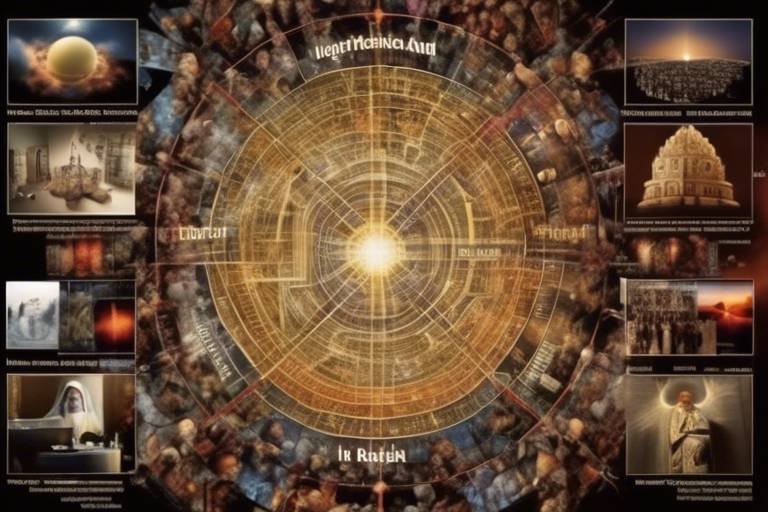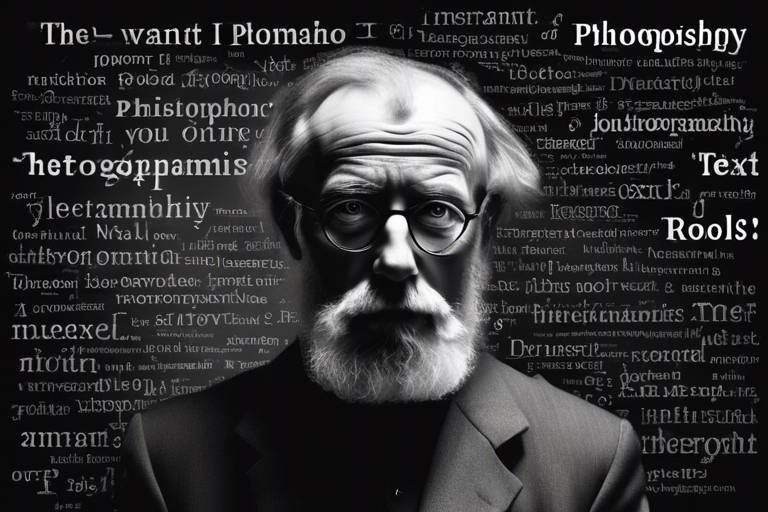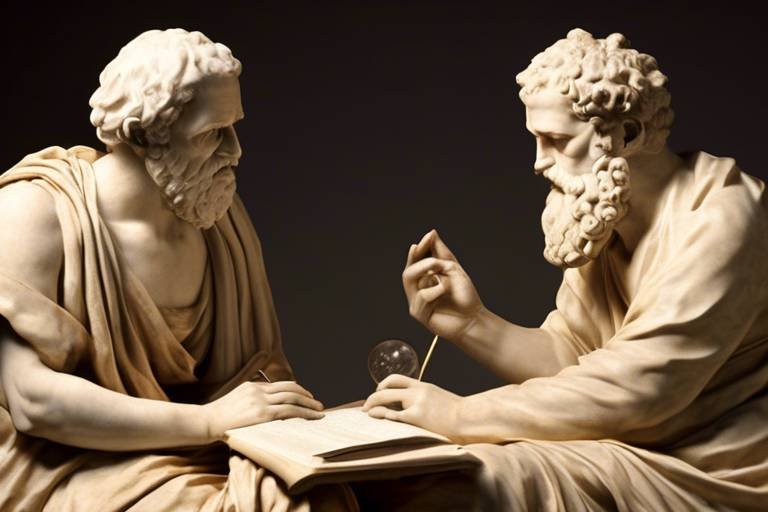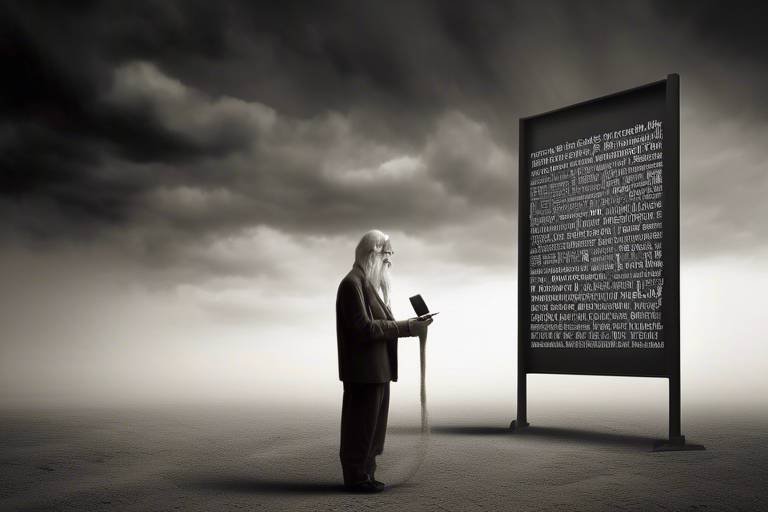Understanding Reality - Can Philosophy and Science Merge?
In the grand tapestry of human thought, the quest to understand reality has been a central theme that weaves through both philosophy and science. These two disciplines, often perceived as distinct, actually share a profound connection in their pursuit of knowledge. Imagine philosophy as the compass that guides our inquiries into the nature of existence, while science acts as the ship navigating the vast oceans of empirical evidence. Together, they embark on a journey to uncover the truths that shape our understanding of the universe.
At first glance, one might think that philosophy and science operate in separate realms; philosophy delves into abstract concepts, while science focuses on tangible phenomena. However, this dichotomy is misleading. Philosophy lays the groundwork for scientific inquiry by posing the essential questions that drive exploration. For instance, when scientists investigate the cosmos, they are not just measuring distances and velocities; they are also grappling with profound philosophical questions about the nature of time, space, and existence itself. This interplay raises intriguing questions: Can the methodologies of these two fields converge? What insights can emerge from their collaboration?
Throughout history, thinkers have attempted to bridge the gap between philosophy and science. From Aristotle’s early musings on the natural world to contemporary discussions on quantum mechanics, the dialogue between these fields has evolved. Philosophers have provided frameworks for understanding scientific theories, while scientists have challenged philosophical assumptions with empirical data. This dynamic relationship prompts us to consider: How can we leverage the strengths of both disciplines to enhance our comprehension of reality?
In this exploration, we will delve into the philosophical foundations that shape our understanding of reality, examining the contributions of key thinkers in metaphysics and epistemology. We will then shift our focus to the scientific perspective, analyzing how empirical evidence and the scientific method illuminate our understanding of the universe. By contrasting empiricism and rationalism, we will uncover the implications of these foundational approaches for our perception of reality.
Furthermore, we will investigate the philosophy of science, illuminating how philosophical inquiry informs scientific practices and the broader implications for our understanding of existence. As we navigate these complex waters, we will highlight the historical and contemporary interplay between philosophy and science, showcasing case studies that exemplify successful collaborations. However, we will also confront the challenges and conflicts that arise when these two realms diverge, examining their implications for knowledge acquisition and our grasp of reality.
Ultimately, the journey to understand reality is not just an academic exercise; it is a deeply human endeavor. By fostering a dialogue between philosophy and science, we can enrich our understanding of existence and unlock new avenues of thought. So, let's embark on this exploration together, questioning, learning, and discovering the intricate layers of reality that await us.
- Can philosophy and science coexist harmoniously? Yes, they can complement each other by addressing different aspects of understanding reality.
- What role does empirical evidence play in philosophy? Empirical evidence informs philosophical theories, particularly in areas like epistemology and the philosophy of science.
- How do historical figures influence contemporary thought? Historical philosophers and scientists provide foundational ideas that continue to shape modern discussions about reality.
- What are the main challenges in merging philosophy and science? Conflicts can arise from differing methodologies, interpretations, and the nature of questions being asked.

The Philosophical Foundations of Reality
When we embark on the journey to understand reality, we must first navigate through the intricate landscape of philosophical thought. Philosophy, in its essence, serves as the bedrock upon which our understanding of existence is built. It raises profound questions about the nature of reality, the existence of the universe, and our place within it. Thinkers throughout history have grappled with these questions, providing frameworks that help us interpret our experiences and the world around us.
One of the central themes in philosophy is metaphysics, which delves into the fundamental nature of reality. Metaphysicians ponder questions like: What is existence? What is the nature of objects, time, and space? These inquiries have led to various philosophical theories that attempt to explain the substance of reality. For instance, the distinction between materialism and idealism presents two contrasting views: materialists argue that only physical matter exists, while idealists contend that reality is fundamentally mental or spiritual.
In addition to metaphysics, epistemology plays a crucial role in our understanding of reality. It focuses on the nature and scope of knowledge, addressing questions such as: How do we know what we know? What constitutes justified belief? Philosophers like Plato and Aristotle laid the groundwork for epistemological inquiry, emphasizing the importance of reason and perception in acquiring knowledge. Their ideas have influenced countless thinkers, shaping our approach to understanding reality through various lenses.
Throughout history, several key figures have emerged as pivotal in shaping our philosophical foundations. For example, René Descartes famously declared, "I think, therefore I am," highlighting the significance of consciousness in establishing a foundation for reality. His dualistic view posited a separation between mind and body, which sparked extensive debate on the nature of existence. On the other hand, Immanuel Kant introduced the concept of the categorical imperative and explored how our perceptions shape our understanding of the world, suggesting that reality is not merely what we observe but is also influenced by our cognitive structures.
To summarize the philosophical foundations of reality, we can look at the following key elements:
| Philosophical Aspect | Description | Key Thinkers |
|---|---|---|
| Metaphysics | Study of existence and the nature of reality. | Plato, Aristotle, Descartes |
| Epistemology | Inquiry into knowledge and justified belief. | Locke, Hume, Kant |
| Materialism | View that only physical matter exists. | Democritus, Karl Marx |
| Idealism | View that reality is fundamentally mental or spiritual. | Berkeley, Hegel |
As we delve deeper into the philosophical foundations of reality, it becomes clear that these ideas do not exist in a vacuum. They intertwine with our understanding of the universe, influencing scientific inquiry and our quest for knowledge. The dialogue between philosophy and science continues to evolve, prompting us to reconsider our assumptions and expand our horizons. By examining the philosophical underpinnings of reality, we can better appreciate the complexities of existence and the myriad ways in which we seek to understand it.
- What is the difference between metaphysics and epistemology?
Metaphysics deals with the nature of reality, while epistemology focuses on the nature and limits of knowledge. - Who are some key figures in the study of reality?
Notable philosophers include Plato, Aristotle, Descartes, Kant, Locke, and Hume. - How do philosophy and science interact?
Philosophy provides foundational questions and frameworks that guide scientific inquiry, while science offers empirical evidence that can challenge or support philosophical theories.

The Scientific Perspective on Reality
When we talk about reality from a scientific perspective, we're diving into a fascinating world where observations, experiments, and theories intertwine to form a cohesive understanding of the universe. Science is like a giant puzzle, where each piece represents a different aspect of reality, and the goal is to fit them together to see the bigger picture. At the heart of this endeavor lies the scientific method, a rigorous approach that emphasizes empirical evidence and repeatability. This method allows scientists to formulate hypotheses, conduct experiments, and analyze data, all while remaining open to revision based on new findings.
One of the most compelling aspects of science is its reliance on empirical evidence. This means that scientists base their conclusions on observable phenomena rather than abstract reasoning or intuition alone. Think of it this way: if philosophy is the map, then science is the journey through uncharted territory, navigating by the stars of data and experimentation. As we explore the cosmos or delve into the microscopic world, we gather evidence that informs our understanding of what reality truly is.
In the realm of science, the distinction between empiricism and rationalism plays a crucial role in shaping our understanding of reality. Empiricism argues that knowledge comes from sensory experience, while rationalism posits that reason and innate ideas are the primary sources of knowledge. To illustrate this, consider the following:
| Aspect | Empiricism | Rationalism |
|---|---|---|
| Source of Knowledge | Sensory Experience | Innate Ideas and Reason |
| Key Figures | John Locke, David Hume | René Descartes, Immanuel Kant |
| Method of Inquiry | Observation and Experimentation | Logical Deduction |
This table highlights the fundamental differences between these two philosophical approaches and their implications for scientific inquiry. While empiricists like John Locke and David Hume emphasize the importance of sensory experience in shaping our understanding of reality, rationalists such as René Descartes and Immanuel Kant argue for the significance of innate knowledge and logical reasoning.
As we navigate the complexities of reality, the interplay between these two perspectives can lead to profound insights. For instance, scientists often rely on empirical data to validate or refute theories, yet they also use rationalist principles to formulate those theories in the first place. This dynamic relationship suggests that while science is grounded in observation, it is also influenced by the philosophical underpinnings that guide our interpretation of that data.
In summary, the scientific perspective on reality is a rich tapestry woven from empirical evidence and rational thought. It challenges us to question our assumptions, explore the unknown, and continuously refine our understanding of the universe. As we push the boundaries of knowledge, we must remember that both science and philosophy serve as vital tools in our quest to comprehend the nature of reality.
- What is the scientific method? The scientific method is a systematic approach to inquiry that involves making observations, forming hypotheses, conducting experiments, and analyzing data to draw conclusions.
- How do empiricism and rationalism differ? Empiricism emphasizes knowledge gained through sensory experience, while rationalism focuses on knowledge derived from innate ideas and logical reasoning.
- Why is empirical evidence important in science? Empirical evidence provides a foundation for scientific claims, ensuring that conclusions are based on observable phenomena rather than speculation.

Empiricism vs. Rationalism
When we dive into the philosophical waters of empiricism and rationalism, it’s like stepping into two distinct worlds that shape how we perceive reality. These two schools of thought represent contrasting approaches to knowledge acquisition, each with its own unique lens through which we can view existence. On one side, we have empiricism, which champions the idea that all knowledge comes from sensory experience. Think of it as the philosophy that insists on getting your hands dirty in the real world; it’s all about observation, experimentation, and tangible evidence. If you can’t see it, touch it, or measure it, then it’s not part of the empirical world.
On the flip side, rationalism asserts that reason and innate knowledge play a crucial role in understanding the universe. Rationalists believe that some concepts and ideas exist independently of sensory experience. They argue that through logical deduction and intellectual reasoning, we can uncover truths that are not necessarily observable. Imagine rationalism as a grand library filled with books of knowledge that you can access with your mind alone, without needing to step outside.
To better understand the differences between these two perspectives, let’s break it down into some key points:
| Aspect | Empiricism | Rationalism |
|---|---|---|
| Source of Knowledge | Experience and observation | Reason and innate ideas |
| Key Figures | John Locke, David Hume | René Descartes, Immanuel Kant |
| Methodology | Scientific method, experimentation | Logical reasoning, deduction |
| View on Reality | Reality is known through the senses | Reality is understood through reason |
The debate between empiricism and rationalism raises some intriguing questions. For instance, can we truly rely on our senses to understand the complexities of reality? Or is there a deeper layer of knowledge that we can access through pure reason? This tension has fueled countless discussions among philosophers, scientists, and curious minds alike.
Empiricists argue that our senses are the only reliable source of information, suggesting that without empirical evidence, any claims about reality are merely conjecture. They often point to the scientific method as the gold standard for uncovering truths about the universe. On the other hand, rationalists counter that there are fundamental truths—like mathematical principles—that exist independently of our sensory experiences. They argue that without the framework of reason, we could easily be misled by our senses, which can be deceptive.
Ultimately, the interplay between empiricism and rationalism is not just a theoretical exercise; it has practical implications for fields ranging from science to ethics. When we conduct scientific research, for example, we often rely on empirical data to inform our conclusions. Yet, the theoretical frameworks that guide our experiments are rooted in rationalist principles. This blend of approaches can lead to a more comprehensive understanding of reality, allowing us to navigate the complexities of existence with both our senses and our intellect.
So, whether you lean more towards the empirical or the rationalist side, it’s clear that both perspectives offer valuable insights into the nature of reality. They challenge us to think critically about how we acquire knowledge and encourage us to explore the world in all its dimensions. As we continue to unravel the mysteries of existence, the dialogue between these two philosophies remains essential, pushing the boundaries of what we know and how we come to know it.
- What is the main difference between empiricism and rationalism? Empiricism emphasizes knowledge gained through sensory experience, while rationalism focuses on knowledge derived from reason and innate ideas.
- Who are some key figures associated with empiricism? Influential empiricists include John Locke and David Hume.
- What role does the scientific method play in empiricism? The scientific method is a systematic approach that relies on observation and experimentation to gather empirical evidence.
- Can empiricism and rationalism coexist? Yes, many philosophers and scientists believe that a combination of both perspectives can lead to a more comprehensive understanding of reality.

Key Figures in Empiricism
Empiricism, the philosophical stance asserting that knowledge comes primarily from sensory experience, has been shaped by several pivotal thinkers throughout history. Among these, John Locke and David Hume stand out as monumental figures whose ideas continue to influence our understanding of reality today. Their contributions not only challenged the prevailing notions of knowledge but also laid the groundwork for modern scientific inquiry.
Starting with John Locke, he famously argued against the notion of innate ideas, positing instead that the mind at birth is a tabula rasa or blank slate. According to Locke, all knowledge is derived from experience, which can be categorized into two types: sensation and reflection. Sensation involves direct interaction with the world through our senses, while reflection pertains to the mind's ability to process and contemplate those sensory experiences. This duality not only emphasizes the importance of empirical evidence but also suggests that our understanding of reality is shaped by our interactions with the world around us.
Locke's influence extends to various fields, including politics and education, where his ideas on individual experience and learning have fostered a more human-centered approach. His work, particularly in An Essay Concerning Human Understanding, serves as a cornerstone for empiricism, urging us to consider how our perceptions and experiences inform our beliefs about reality.
Moving on to David Hume, we find a philosopher who took empiricism to even greater depths. Hume is best known for his skepticism regarding causation and the limits of human understanding. He argued that while we may observe patterns in the world, we cannot directly observe causation; instead, we infer it based on habitual experience. This leads to a profound implication: our beliefs about reality are often founded on custom and habit rather than definitive proof. Hume’s skepticism challenges us to question the very foundations of our knowledge and suggests that our understanding of reality is, to some extent, a construct of our experiences and interpretations.
Moreover, Hume's exploration of induction—the process of deriving general principles from specific observations—raises critical questions about the reliability of our reasoning. He famously questioned whether we could ever truly justify inductive reasoning, thereby shaking the pillars of both philosophy and science. His work has prompted further inquiry into the nature of knowledge and has encouraged subsequent philosophers and scientists to grapple with these fundamental issues.
In summary, the contributions of Locke and Hume to empiricism have had a lasting impact on our comprehension of reality. They remind us that our understanding is not merely a reflection of the external world but is also shaped by our subjective experiences. By examining the world through the lens of empiricism, we can appreciate the complexity of knowledge and the intricate interplay between our senses and our understanding.
As we delve deeper into the philosophy of science and the interplay between philosophy and empirical research, it becomes clear that the questions raised by these key figures remain relevant today. Their insights challenge us to consider how we gather knowledge, the validity of our beliefs, and the very nature of reality itself.
- What is empiricism? Empiricism is the philosophical belief that knowledge is primarily gained through sensory experience.
- Who are the key figures in empiricism? The most notable figures include John Locke and David Hume, who significantly contributed to the development of empirical thought.
- How does empiricism differ from rationalism? While empiricism emphasizes knowledge through experience, rationalism asserts that reason and innate ideas are the primary sources of knowledge.
- Why is understanding empiricism important? Understanding empiricism is crucial as it influences scientific methods and our approach to knowledge and reality.

Rationalist Contributions
Rationalism, a cornerstone of philosophical thought, asserts that reason is the primary source of knowledge. This approach stands in contrast to empiricism, which emphasizes sensory experience. One of the most significant figures in rationalism is René Descartes, often hailed as the father of modern philosophy. Descartes famously proclaimed, "I think, therefore I am," which encapsulates his belief that the act of thinking is proof of one’s existence and, by extension, a foundation for acquiring knowledge. His method of doubt encouraged individuals to question everything until they reached indubitable truths, laying the groundwork for a more structured approach to knowledge.
Another pivotal rationalist is Immanuel Kant, who sought to bridge the gap between rationalism and empiricism. Kant argued that while all knowledge begins with experience, it does not necessarily arise from experience alone. He proposed that the human mind plays an active role in shaping our understanding of reality through innate categories of thought. For Kant, concepts such as space and time are not merely external realities but are frameworks through which we interpret our experiences. This perspective revolutionized the way we consider the relationship between the mind and the world, suggesting that our understanding of reality is both constructed and perceived.
Rationalists like Descartes and Kant have significantly influenced various fields, including mathematics, ethics, and metaphysics. Their contributions have helped to establish a model of knowledge that values logical deduction and systematic reasoning. For instance, in mathematics, the rationalist approach has led to the development of proofs that rely on axioms and logical inference, demonstrating how abstract reasoning can yield concrete truths. Similarly, in ethics, rationalist thought has provided a framework for understanding moral principles as universal truths, rather than subjective opinions shaped by cultural context.
To further illustrate the impact of rationalist contributions, consider the following table that compares key rationalist thinkers and their main ideas:
| Philosopher | Key Contribution | Impact on Understanding of Reality |
|---|---|---|
| René Descartes | Method of Doubt | Established a foundation for modern philosophy and the importance of skepticism in knowledge acquisition. |
| Immanuel Kant | Categorical Imperative | Introduced a framework for understanding morality as a rational principle applicable to all rational beings. |
| Baruch Spinoza | Substance Monism | Proposed that everything that exists is part of a single substance, influencing metaphysical and theological discussions. |
In conclusion, the contributions of rationalist philosophers have profoundly shaped our understanding of reality. By emphasizing the role of reason, they have challenged us to think critically about our beliefs and the nature of existence. Their legacy continues to influence contemporary philosophical debates and scientific inquiries, reminding us that while sensory experience is vital, the power of reason is equally essential in our quest for knowledge.
- What is rationalism? Rationalism is a philosophical approach that emphasizes reason as the primary source of knowledge, contrasting with empiricism, which focuses on sensory experience.
- Who are the key figures in rationalism? Notable rationalists include René Descartes, Immanuel Kant, and Baruch Spinoza, each contributing significantly to our understanding of reality.
- How does rationalism influence science? Rationalism encourages the use of logical reasoning and deduction in scientific inquiry, helping to formulate hypotheses and theories based on rational thought.

Philosophy of Science
The serves as a bridge connecting the abstract world of philosophical inquiry with the tangible realm of scientific practice. It invites us to ponder profound questions: What constitutes scientific knowledge? How do we differentiate between science and non-science? And what is the essence of scientific explanation? By examining these questions, we can better understand how scientific methodologies shape our perceptions of reality.
At its core, the philosophy of science scrutinizes the foundations, methods, and implications of science. It delves into the principles that guide scientific inquiry, such as falsifiability, replicability, and empirical adequacy. These principles are not merely technical details; they are the bedrock upon which scientific knowledge is built, allowing scientists to construct and refine theories that explain the natural world. For instance, the philosopher Karl Popper famously argued that a theory must be falsifiable to be considered scientific, suggesting that the ability to test and potentially disprove a hypothesis is what differentiates science from other forms of knowledge.
Moreover, the philosophy of science examines the scientific method, a systematic approach to inquiry that involves observation, experimentation, and theoretical formulation. This method is not just a set of steps; it embodies a way of thinking that prioritizes evidence and rationality. Scientists collect data through experiments, analyze results, and draw conclusions, all while remaining open to revising their theories in light of new evidence. This iterative process is akin to a sculptor chiseling away at a block of marble; each strike reveals a clearer form, just as each experiment unveils a deeper understanding of reality.
However, the philosophy of science is not without its challenges. It grapples with the demarcation problem, which seeks to establish clear criteria for distinguishing science from pseudoscience. This issue is particularly relevant in contemporary discussions about topics such as climate change and vaccination, where scientific consensus may clash with public opinion or belief systems. The implications of these debates are profound, as they can shape public policy and influence societal attitudes towards science.
Furthermore, the philosophy of science encourages us to reflect on the ethical dimensions of scientific research. As scientific advancements propel us into uncharted territories—think of genetic engineering or artificial intelligence—we must consider the moral implications of our discoveries. Questions arise: Should we pursue certain lines of inquiry? What responsibilities do scientists have towards society? In this sense, the philosophy of science is not just an academic exercise; it is a vital discourse that impacts the very fabric of our lives.
In conclusion, the philosophy of science is a dynamic field that enriches our understanding of both science and reality. By critically examining the principles and practices that underpin scientific inquiry, we can cultivate a more nuanced appreciation of the world around us. As we navigate the complexities of modern science, let us embrace the philosophical questions that challenge our assumptions and inspire us to seek deeper truths.
- What is the philosophy of science? The philosophy of science explores the foundations, methods, and implications of scientific inquiry, focusing on what constitutes scientific knowledge and how it differs from other forms of understanding.
- Why is the philosophy of science important? It helps us critically evaluate scientific practices, understand the ethical implications of scientific research, and navigate the challenges of distinguishing science from pseudoscience.
- How does the philosophy of science relate to reality? By examining the principles of scientific inquiry, the philosophy of science enhances our understanding of the nature of reality and how we come to know it through empirical evidence and rational thought.

The Interplay Between Philosophy and Science
The relationship between philosophy and science is a fascinating dance, one that has evolved over centuries and continues to shape our understanding of reality. At first glance, these two fields might seem to operate in separate realms—philosophy pondering the abstract questions of existence, while science focuses on concrete observations and empirical evidence. However, a closer look reveals that they are inextricably linked, each providing insights that the other cannot achieve alone. This interplay is not merely academic; it has profound implications for how we comprehend the universe and our place within it.
Historically, philosophy laid the groundwork for scientific inquiry. Thinkers like Aristotle and Galileo were not just philosophers; they were also scientists who used logical reasoning to investigate the natural world. They asked questions that sparked scientific exploration: What is the nature of motion? How do celestial bodies interact? Their philosophical inquiries paved the way for the scientific method, a systematic approach to understanding reality through observation and experimentation. This method has become the backbone of modern science, allowing us to unravel the mysteries of the universe.
In contemporary discussions, the interplay between philosophy and science is more relevant than ever. Take, for example, the field of quantum mechanics. Philosophers have long debated the implications of quantum theory, questioning the nature of reality itself. Is reality deterministic, or is it fundamentally probabilistic? These questions are not merely theoretical; they influence how scientists interpret their findings. The philosophical implications of quantum mechanics challenge our traditional understanding of causality and existence, prompting scientists to rethink what they know about the universe.
Moreover, the collaboration between philosophy and science is not without its challenges. There are instances where philosophical speculation can lead to conflict with scientific evidence. For instance, consider the debate surrounding the concept of free will. Philosophers argue about whether humans possess free will or if our actions are predetermined by physical laws. Scientists, particularly in neuroscience, are uncovering evidence that suggests our decisions may be influenced by brain activity that occurs before we are even conscious of making a choice. This clash raises important questions about responsibility and moral accountability, forcing both philosophers and scientists to reevaluate their positions.
Despite these challenges, there are numerous examples of fruitful collaboration between the two disciplines. Case studies in areas like ethics in artificial intelligence showcase how philosophical frameworks can guide scientific research. As technology advances, ethical considerations become paramount. Philosophers provide the necessary tools to navigate these complex moral landscapes, ensuring that scientific progress does not come at the expense of humanity's core values. This synergy exemplifies how philosophy can enhance scientific endeavors, leading to more responsible and thoughtful advancements.
To summarize, the interplay between philosophy and science is a dynamic and evolving relationship. Each discipline enriches the other, creating a more comprehensive understanding of reality. As we continue to explore the cosmos and delve into the depths of consciousness, the collaboration between these two fields will undoubtedly lead to new insights and revelations. The future of our understanding hinges on this partnership, as we seek to answer the profound questions that define our existence.
- How does philosophy influence scientific research? Philosophy provides ethical frameworks and critical thinking skills that help scientists navigate complex moral issues and interpret their findings.
- Can science answer all philosophical questions? While science can address many empirical questions, there are philosophical inquiries—such as those concerning meaning and existence—that may remain beyond its reach.
- What are some examples of philosophical questions that have scientific implications? Questions about free will, the nature of consciousness, and the interpretation of quantum mechanics are key areas where philosophy and science intersect.

Case Studies in Collaboration
When we think about the intersection of philosophy and science, it’s like imagining two powerful rivers converging to create a vast ocean of knowledge. This collaboration has led to groundbreaking discoveries and profound insights into the nature of reality. Let's dive into some fascinating case studies that showcase how these two disciplines have worked together to expand our understanding of the universe.
One of the most notable examples of this collaboration is found in the field of quantum mechanics. Philosophers like Werner Heisenberg and Niels Bohr not only contributed to the development of quantum theory but also engaged in deep philosophical discussions about the implications of their findings. Heisenberg's uncertainty principle, for instance, raises profound questions about determinism and the nature of reality itself. This principle states that the more precisely we know a particle's position, the less precisely we can know its momentum, challenging the classical notion of a deterministic universe. This philosophical inquiry into the implications of quantum mechanics has led to a richer understanding of reality, suggesting that at a fundamental level, the universe may be inherently probabilistic.
Another compelling case study can be found in the realm of neuroscience. The exploration of consciousness has been a hotbed for both philosophical and scientific inquiry. Philosophers like David Chalmers have posed the famous "hard problem" of consciousness, questioning why and how subjective experiences arise from physical processes in the brain. This philosophical query has spurred scientific research into the neural correlates of consciousness, leading to collaborative efforts between philosophers and neuroscientists. For example, studies using advanced imaging techniques have begun to map brain activity associated with conscious experience, bridging the gap between subjective experience and objective measurement.
Moreover, the field of climate science has seen fruitful collaborations as well. Philosophers have contributed to discussions about ethics and responsibility in the face of climate change. Thinkers like Peter Singer have influenced the scientific community by framing the ethical implications of climate change, urging scientists to consider the moral dimensions of their research. This has led to a more holistic approach in climate science, where empirical data is analyzed alongside ethical considerations, reinforcing the idea that our understanding of reality must include not just the facts but also the values that guide our actions.
In addition to these examples, the development of artificial intelligence (AI) represents another area where philosophy and science intersect. Philosophers like Nick Bostrom have raised critical questions about the implications of AI on society and ethics. His work has prompted scientists and engineers to consider the ethical dimensions of their innovations, fostering a dialogue that seeks to ensure that AI development aligns with human values and societal good. This collaboration has been crucial in shaping policies and guidelines that govern AI technologies, illustrating how philosophical inquiry can directly influence scientific advancement.
These case studies highlight the dynamic interplay between philosophy and science. The collaboration between these two fields not only enriches our understanding of complex issues but also drives innovation and ethical considerations in scientific practice. As we continue to explore the mysteries of reality, the fusion of philosophical thought and scientific inquiry will remain essential in navigating the challenges and opportunities that lie ahead.
- How do philosophy and science complement each other? Philosophy provides a framework for understanding the implications of scientific discoveries, while science offers empirical evidence that can inform philosophical debates.
- Can philosophical questions be answered scientifically? Some philosophical questions, particularly those related to consciousness and ethics, can be explored through scientific methods, leading to richer insights.
- What role do case studies play in the collaboration between philosophy and science? Case studies illustrate real-world applications of philosophical concepts in scientific research, demonstrating how these disciplines can work together effectively.

Challenges and Conflicts
As we delve deeper into the realms of philosophy and science, it becomes increasingly evident that their paths do not always align harmoniously. This divergence often leads to significant challenges and conflicts that can cloud our understanding of reality. One of the most prominent issues arises from the fundamental differences in their methodologies. While science relies heavily on empirical evidence and the scientific method, philosophy often engages in abstract reasoning and theoretical speculation. This disparity can create friction, as each discipline may dismiss the other's approach as inadequate or irrelevant.
Moreover, the nature of questions posed by each field can lead to conflicts. Scientists tend to focus on how things happen, seeking to uncover mechanisms and processes through observation and experimentation. In contrast, philosophers often grapple with why things are the way they are, exploring concepts such as existence, meaning, and morality. This difference can lead to a lack of communication and understanding, as scientists may view philosophical inquiries as ungrounded or impractical, while philosophers might see scientific pursuits as overly reductionist.
Another significant challenge arises from the interpretation of scientific findings. As scientific discoveries unfold, they can often challenge longstanding philosophical beliefs. For instance, the theory of evolution has raised profound questions about human existence and purpose, prompting philosophers to reassess their views on free will and determinism. Such paradigm shifts can create tension, as both scientists and philosophers may feel their foundational beliefs are under threat. This dynamic can lead to a standoff, where neither side is willing to compromise or engage in constructive dialogue.
Additionally, the rise of interdisciplinary studies has created a new landscape where philosophy and science can potentially collaborate, yet it also presents its own set of challenges. For example, fields like cognitive science or quantum physics often require philosophical insights to interpret complex findings. However, the integration of these disciplines can be fraught with misunderstandings and misinterpretations, as each field brings its own jargon and conceptual frameworks. This can result in a scenario where the collaboration intended to enhance our understanding of reality instead becomes a source of further confusion.
Despite these challenges, it’s essential to recognize that the conflicts between philosophy and science can also be viewed as opportunities for growth. The tension can spark critical discussions that push both fields to refine their concepts and methodologies. Engaging with conflicting viewpoints can lead to a more nuanced understanding of reality, enriching both philosophical discourse and scientific inquiry. In this way, rather than seeing these challenges as barriers, we can embrace them as integral components of a broader quest for knowledge.
- What are the main differences between philosophy and science?
Philosophy often deals with abstract concepts and theoretical questions, while science focuses on empirical evidence and observable phenomena. - Can philosophy and science work together?
Yes, they can collaborate effectively, especially in interdisciplinary fields, but challenges and misunderstandings can arise. - How do philosophical questions impact scientific research?
Philosophical questions can guide scientific inquiry by framing the issues at stake and helping to interpret findings. - Are there any historical examples of philosophy influencing science?
Yes, many scientific revolutions have been propelled by philosophical ideas, such as the shift towards empiricism during the Enlightenment.
Frequently Asked Questions
- What is the main focus of the article?
The article explores the intersection of philosophy and science, examining how both fields contribute to our understanding of reality. It highlights their methodologies, historical relationships, and the potential for collaboration in uncovering truths about the universe.
- How do philosophy and science differ in their approaches to understanding reality?
Philosophy often relies on critical thinking, logical reasoning, and theoretical frameworks to explore concepts of existence and knowledge. In contrast, science uses empirical evidence and the scientific method to investigate natural phenomena, focusing on observable and measurable aspects of reality.
- What are the key philosophical theories discussed in the article?
The article delves into significant philosophical theories from both empiricism and rationalism. It discusses influential thinkers like John Locke and David Hume for empiricism, and René Descartes and Immanuel Kant for rationalism, highlighting their contributions to our understanding of reality.
- Can philosophy and science work together?
Absolutely! The article showcases case studies where philosophy and science have collaborated effectively. These partnerships have led to deeper insights into fundamental questions about existence, illustrating how both disciplines can enhance our comprehension of reality.
- What challenges do philosophy and science face when interacting?
One major challenge is the divergence in methodologies; philosophical questions may not always yield to scientific investigation, leading to conflicts. The article addresses these challenges and discusses their implications for our understanding of knowledge and reality.
- Why is it important to understand the relationship between philosophy and science?
Understanding this relationship enriches our perspective on reality. It helps us appreciate how different approaches can complement each other, leading to a more comprehensive grasp of complex issues related to existence, knowledge, and the universe.



















